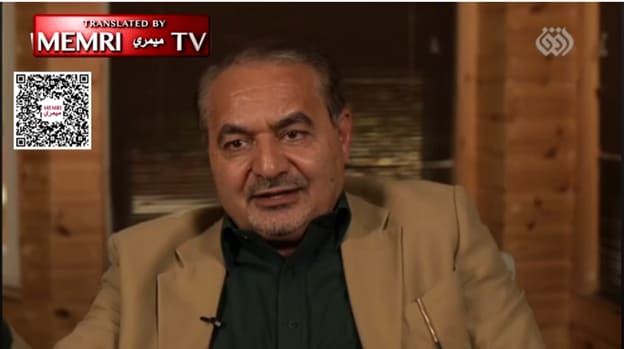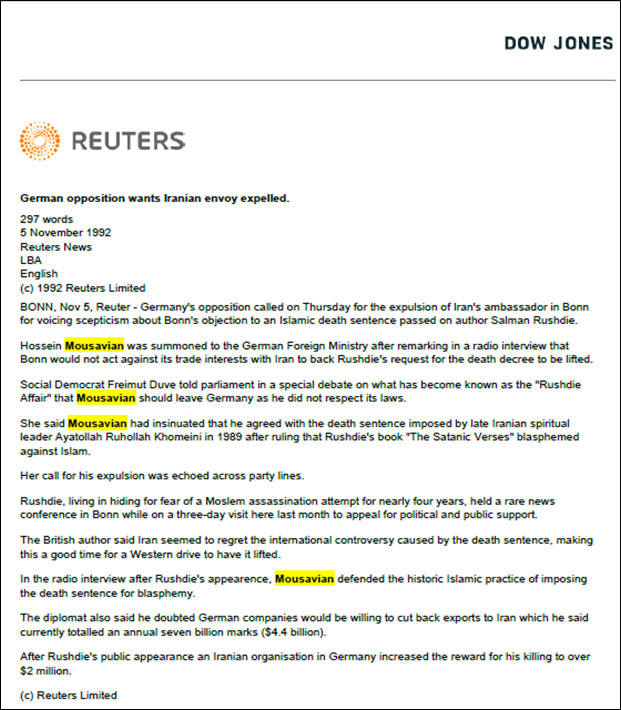
Seyed Hossein Mousavian Endorsed Ayatollah Ruhollah Khomeini's Fatwa Condemning British Author Salman Rushdie To Death
Former Iranian government official and current Princeton University academic Seyed Hossein Mousavian is facing a U.S. House Committee on Education and the Workforce investigation for allegedly advancing the interests of the Islamic Republic of Iran in America.
Mousavian was Iranian Ambassador to Germany from 1990 to 1997, and during his tenure, in 1992, Iranian and Hizbullah operatives assassinated Kurdish dissidents in a Mafia-style attack at the Mykonos restaurant in Berlin.
According to an archived 1997 article from the Berlin newspaper Der Tagesspiegel (see below), Abolghasem Mesbahi, a former Iranian intelligence official, told a Berlin court during the Mykonos trial: "Mousavian participated in most of the [Iranian regime's] crimes that took place in Europe."
Mousavian has served in a number of senior posts within the Iranian government, including as head of the Foreign Relations Committee of Iran's National Security Council (1997-2005). He played a key role in the nuclear negotiations between Iran and the world powers, and was Iran's spokesman for the 2003-2005 nuclear talks on Iran's desire to build a nuclear program. He was also foreign policy advisor to the secretary of the Supreme National Security Council (2005-2007).
In 2005, Mousavian, who at that time still headed the Foreign Affairs Committee of Iran's Supreme National Security Council but was no longer part of the Iranian nuclear negotiating team, told the Islamic Republic News Agency: "In the past two years, during which I have participated in the Iran-E.U. negotiations, it has been clear to me that E.U. acceptance of [our right to uranium] enrichment would necessitate a framework that would allay both parties' concerns. The framework has been established during the past two years of negotiations, and includes bilateral, regional and international issues." (see MEMRI Special Dispatch No. 940, Senior Iranian Official: Europe Will Recognize Iran's Right to a Limited Nuclear Fuel Cycle; Iran to Start Operations at Isfahan Uranium Conversion Facility, July 22, 2005. Uranium enrichment is a precondition for the construction of a nuclear weapon.
Mousavian was the General Director of Foreign Ministry for West Europe (1987-1990), editor-in-chief of the Iranian pro-regime English-language Tehran Times newspaper (1980-1990), and Chief of Parliament Administration (1984-1986). He was also a member of the editorial board of the Iranian pro-regime Resalat daily.
He is currently a Middle East Security and Nuclear Policy Specialist at the Program on Science and Global Security at Princeton University; he was hired by Princeton in 2009. In 2020, he attended the funeral in Iran of IRGC Qods Force commander Qassem Soleimani, a U.S.-designated terrorist. Soleimani was killed in a U.S. airstrike January 3, 2020 in Iraq, due to his role in the murder of over 600 U.S. military personnel and in the planning of terror attacks on U.S. interests.
In a January 9, 2022 interview on Iran's Ofogh TV, Mousavian said that a few days after Iran struck the Ain Al-Assad Airbase in Iraq, he had been told that the wife of Brian Hook, who was the U.S. Special Representative for Iran, "could not sleep" because she feared that her husband would be killed in retribution for his part in Soleimani's killing (view his statements in this MEMRI TV clip)
In 1997 Interview With The German Taz Daily, Mousavian Expressed Support For Hamas And Hizbullah
Below is the transcript of a December 16, 1997 interview with Mousavian when he was Iranian Ambassador to Germany, in the German daily Taz, under the headline "The Critical Dialogue is Dead." It was conducted following his return from Tehran after the Berlin Supreme Court convicted Iranian and Hizbullah operatives in the 1992 Mykonos restaurant killings of Kurdish dissidents in Berlin.
The court had sentenced Iranian intelligence operative Kazam Darabi to life imprisonment, with Iranian secret service chief Ali Fallahian[1] implicated in the verdict as the principle perpetrator of the killings. As a result, all EU member states except Greece recalled their ambassadors from Tehran.
In the interview, Mousavian referred to the court conviction as "nonsense," declared Iran's support for Hamas "in its struggle," and said: "We support Hizbullah morally."
Below is the interview:
Mousavi's Taz Interview: "The Critical Dialogue Is Dead"
"The Iranian ambassador returned to Bonn. This is a good start, says Hossein Mousavian. He considers the resumption of critical dialogue to be out of the question...
Taz: Will German-Iranian relations be strained again if the Mykonos ruling becomes legally binding?
Mousavian: It will not be without irritation.
Taz: The European foreign ministers will discuss in January how they want to continue the critical dialogue. Are you still available for such a dialogue?
Mousavian: We will not take part in such a critical dialogue. In our view, the critical dialogue is dead and cannot be revived.
Taz: The deputy chairman of the CDU/CSU[2] parliamentary group in the Bundestag, Rudolf Seiters, has said that he would make the resumption of the dialogue conditional on Iran respecting international law and refraining from all forms of state terrorism, especially against members of the opposition abroad. Can you fulfill this expectation?
Mousavian: Iran will not accept any conditions for the start of the dialogue or any talks. I recommend that German politicians first solve their own human rights problems within the country before interfering in the affairs of other nations.
Taz: Since the Islamic Republic of Iran came into existence, several hundred opposition members have died worldwide – at the hands of perpetrators who came from Tehran. Who was behind the Mykonos attack, for example?
Mousavian: We have been shown no evidence that Iran had anything to do with it. We don't know who is behind it and what conflicts exist within such groups.
Taz: However, a German court has deemed it proven that the Mykonos attack was carried out by the Iranian government.
Mousavian: What the court claims is nonsense.
Taz: Does Iran support groups like Hizbullah and Hamas?
Mousavian: If by that you mean that we supply Hamas with weapons: No, we do not. But if you mean that we support the Palestinians in their struggle, yes, we do.
Taz: Does Iran support Hizbullah materially or financially in any way?
Mousavian: We support Hizbullah morally and not by supplying weapons.
Taz: At the Islamic Conference, your President Khatami spoke of a "just and honorable peace" that should be based on the "legitimate rights of the Palestinians." Does Iran thereby recognize Israel's right to exist?
Mousavian: Mr. Khatami already said in his first interview after his election that he does not recognize Israel's existence. But the formula he proposes for peace is supported by everyone in Iran: that all the rights of the Palestinians be recognized, that the occupied territories be returned and the Palestinian refugees be allowed to return, that there be free elections among all population groups, Christians, Jews and Arabs.
Taz: You talk about the 'occupied territories'. Which are these, the territories occupied in 1967 or the whole of Palestine?
Mousavian: The term Palestine is very old. The area is shown on maps. This is the area I mean. It belongs to all groups: Muslims, Jews and Christians.
Taz: When the European foreign ministers discuss their relationship with Iran, it will also be measured against the case of Salman Rushdie.
Mousavian: There was an amicable agreement regarding Salman Rushdie. If this were to be revived, we could live with it.
Taz: Can you give us the details?
Mousavian: It was discussed that both sides – Europeans and Iran – first jointly condemn terrorism and then say that they will not interfere in the internal affairs of the other side, and thirdly that Iran will not send a commando to kill Salman Rushdie.
[On May 17, 1992, the Iranian news agency IRNA reported that the 15th Khordad Foundation had increased the bounty on Rushdie. It had further agreed to "also cover the costs arising from the execution of the banned author" – a clear invitation to mercenary groups to also claim any expenses. The bounty increase after Rushdie's visit to Bonn was therefore the second in 1992. The Iranian radio station Voice of the Islamic Republic of Iran reported on June 30, 1992 that the Iranian Majlis had passed a resolution renewing the fatwa by 170 out of 270 votes.]
Taz: Why did such an agreement fail?
Mousavian: Because of the Mykonos proceedings, it has been abandoned for the time being.
Reuters Report, November 5, 1992
A November 5, 1992 Reuters report titled "German Opposition Wants Iranian Envoy Expelled: stated:
" ...Hossein Mousavian was summoned to the German Foreign Ministry after remarking in a radio interview that Bonn would not act against its trade interests with Iran to back Rushdie's request for the death decree to be lifted.
"Social Democrat Freimut Duve told parliament in a special debate on what has become known as the "Rushdie Affair" that Mousavian should leave Germany as he did not respect its laws...
"In the radio interview after Rushdie's appearance, Mousavian defended the historic Islamic practice of imposing the death sentence for blasphemy."

Der Tagesspiegel Article "Zeuge belastet Irans Botschafter," February 8, 1997
In this Der Tagesspiegel article from February 8, 1997, Abolghasem Mesbahi, a former high-level Iranian intelligence official who testified in the Mykonos trial, accused Mousavian of responsibility for most of the Iranian regime's crimes in Europe.


[1] In 1995, Germany's Federal Court of Justice issued an arrest warrant against Ali Fallahian (he had initially been considered by the German government to have immunity as a guest of the state, as the head of the secret agency) for his involvement in the Mykonos restaurant killings in Berlin. Taz.de/!1596592/, October 12, 1993.
[2] CDU – Christian Democratic Union/ CSU – Christian Social Union. The collaboration between the two parties is known as the "the Union."




